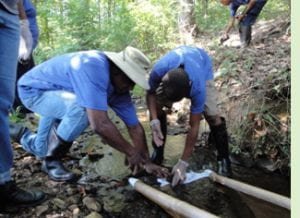Introduction-Ecofem.
Brittle Paper (Philosophy blog) is an African Literary Experience. I chose a poem
“After one come ten.” By Golden A. Ahuachaogu. It is about “women teaching women how to be women.” (Ahuachaogu) The poem deals with preparation for marriage and various practices in different regions of Nigeria. In the North, “the bride is soaked in coconut oil and pampered with ori, while she remembers her youngness in the rain naked with her brothers.” Today her mother whispers,” tomorrow, you’ll be a woman.” (Ahuachaogu) But in the South, they tell the girls, “you’ll save yourself for marriage …the adage of their mothers … and mothers of their grandmothers… and swallow the screams of these daughters, while they spit into young vaginas and stitch them up.” (Ahuachaogu)
I am Bridget B, who live in the “Peach State” Georgia in Dekalb county. Georgia residents are not as environmentally conscious as residents in many Northern states. Dekalb county maintains a department called “Keep Dekalb Beautiful” and workers go and remove trash from neighbourhood streets-when residents call, or do so on the road sides. It is inconceivable what is thrown from vehicles or placed on areas where no one lives. The Watershed Management department instituted a program in 2001-‘Adopt-a-Stream’ to protect and save. Volunteers are trained to do so.
The choice of this poem is interesting. I could use the knowledge gained from this course to inform and educate women and girls about protecting the environment, and the deleterious effects when ignored. I say women and girls because they are the primary home makers-cleaning, laundry, grocery shopping, and shopping. Queen Rania of Jordan said, “if you educate a woman, you educate a family, if you educate a girl, you educate the future.” This statement is a continuum, the girl in the woman’s family, and then the girl, for a safer and cleaner environment. Am pursuing a degree in WGS, with perhaps a concentration in Cross-Cultural Studies. Spitting in young vaginas is a rite of passage in some Arab, African and Asian countries, to preserve her chastity until marriage. I understand the rudimentary principles of this act, termed ‘genital mutilation’ by the West. How could Cross-Cultural studies give me a voice to join the chorus and rale against this practice? There are limitations, like those I would encounter in practicing the principles of Ecofeminism.

